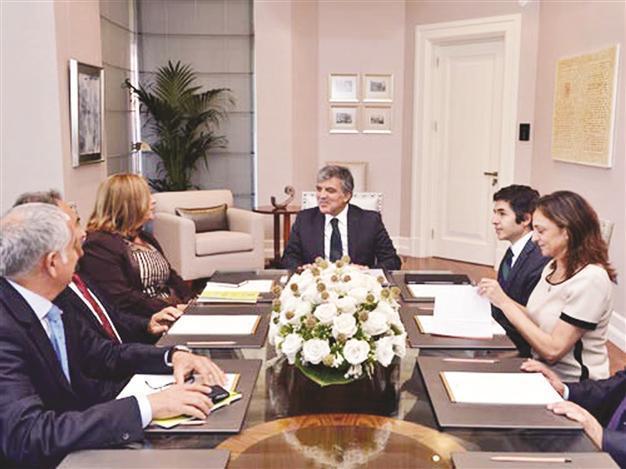Alevis voice concerns in report to Turkish President Gül
ISTANBUL

The group met with the president on Aug. 26 to present a recent report on the issues that Alevis and Bektashis experience in their daily lives. DHA photos
The Alevi Bektaşi Cultural Institute has presented its report on the Alevi and Bektaşi community’s problems to the president, stressing that the main problems are lack of trust and dialogue, and suggesting reforms to the Religious Affairs Directorate.The report presented to President Abdullah Gül on Aug. 26 by a committee from the Alevi Bektaşi Cultural Institute explores the problems of Alevis and Bektaşis and suggests possible solutions to these problems.
The most imminent problem that awaits a solution, according to the report, is the lack of trust and dialogue, which leads the Alevi and Bektaşi population to feel like a “step child” within the Turkish Republic, which they are otherwise happy to be a part of.
“The ones who are most effected by and get the biggest harm from the ‘neighborhood pressure’ that is seen in everyday life are the Alevis and Bektaşis. The oppressive pressure makes Alevis more aggressive, rather than transform them. It makes them use a sharper language when mentioning their demands and also seriously harms the trust relationship they have with the government, which hardly exists anyway,” reads the report.
The report also considers possible reforms to the Religious Affairs Directorate, suggesting that a new designation of the establishment should be conducted by “experts and staff who can handle the topic in every possible dimension.” “Freedom of belief” should not be harmed during the reformation process, which should be supported by “objective scientific research,” it states.
Religious education
Another topic that the report highlights is the problem encountered in religious education at schools, which is defined as a “problem with many angles.” It puts forth complaints as such that even though the name of a class in state schools is “Religious culture and moral knowledge,” the course places its emphasis on the Sunni version of Islam. A course named “religious culture” should be offered in schools instead, which would not only provide information on Sunni Islam but also on the history of religion.
The report also complains that cemevis (houses of worship for Alevis) are not considered official houses of worship in Turkey, and that a mosque can “substitute” as a cemevi. “A place that a community calls holy makes it a holy [place]. The discourse that cemevis are not houses of worship disturbs Alevi citizens very much,” reads the report, adding that spaces for cemevis should be included in zoning plans.
The report states that due to years of not being able to live up to the religion’s rituals because of social pressure, the Alevi-Bektaşis are struggling to pass their traditions on to new generations.
















